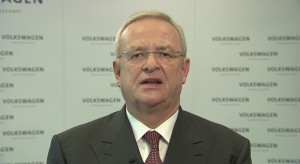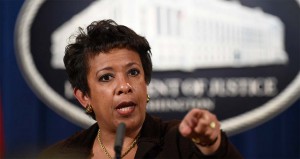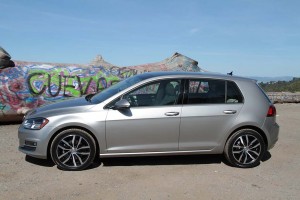The U.S. Justice Department and several other federal agencies have announced a $4.3 billion settlement of the criminal investigation of Volkswagen AG’s diesel emissions rigging, regulators also revealing that six executives have been indicted on charges ranging from wire fraud to conspiracy to defraud the government.
Justice officials said the investigation will continue into actions that might have been taken by other officials. The list of those involved in the scandal, they noted during a Wednesday afternoon news conference in Washington, D.C., include some “very significant people in the company,” one executive managing more than 10,000 other employees. The automaker had previously tried to downplay the situation, insisting on several occasions that only a “handful” of “rogue” workers had been involved.
“It is now clear Volkswagen’s top officials knew about these activities and kept the American government and the American people in the dark,” said Andrew McCabe, deputy director of the FBI, “and they did it for years.”
In September 2015, the U.S. Environmental Protection Agency accused VW of rigging the 2.0-liter turbodiesel engines used in about 475,000 vehicles sold in this country so that they could illegally pass emissions tests. In real-world situations, the EPA charged, those vehicles would produce up to 40 times more than the allowable limit of pollutants such as smog-causing oxides of nitrogen.
The automaker confirmed it had installed a “defeat device” on 11 million vehicles sold worldwide using that engine. It subsequently acknowledged similar software was used for 80,000 vehicles with a 3.0-liter diesel sold in the U.S. by the VW, Audi and Porsche brands.
For years, Volkswagen promoted the idea that its diesel-powered vehicles were clean, fuel-efficient and fun to drive. When it wasn’t possible to meet those goals, said Attorney General Loretta Lynch, “they ultimately lied.”
Initially, top management, including former U.S. boss Michael Horn, tried to downplay the conspiracy, insisting it was the results of a “handful” of employees who decided to take shortcuts. But the government investigation revealed the truth to be quite different.
One engineering manager was charged last year, pleading guilty in September. Another six have now been indicted, including Oliver Schmidt, who was arrested in Florida over the weekend. The investigation found Schmidt talking to numerous colleagues and other Volkswagen employees about the growing scandal. In one e-mail, he reportedly wrote, “It should first be decided whether we are honest. If we are not honest, everything stays as it is.”
The six who have been indicted were far from low-level engineers, according to the government, Assistant Attorney General Leslie Caldwell noting that “very significant people in the company” were involved in the development of the defeat device software and subsequent cover-up, including one who directly oversaw about 10,000 VW employees.
(Click Here for more on the weekend arrest.)

Other VW officials could still face charges. Former CEO Martin Winterkorn has been named in an ongoing German investigation.
Caldwell and Lynch suggested that there were fundamental problems with VW’s corporate structure allowing the scandal to spread. The automaker has not only agree to pay a hefty fine and undergo three years of probation but restructure its internal operations to ensure such subterfuge isn’t repeated.
Several observers familiar with the company said they question whether that will be enough, noting VW has a very strong top-down management approach and a culture that seldom accepts failure. That was underscored by comments made by now-retired VW Chairman Ferdinand Piech.
When he became CEO in 1993, Piech set a series of extremely difficult projects for his staff. When asked what would happen if they failed, he declared, “I would tell them they are all fired and bring in a new team. If they failed, I would fire them, too.” His hand-picked successor, Martin Winterkorn maintained that can’t-fail culture.
Responding to the announcement of the settlement, Volkswagen Group CEO Matthias Mueller said in a statement, “Volkswagen deeply regrets the behavior that gave rise to the diesel crisis. Since all of this came to light, we have worked tirelessly to make things right for our affected customers and have already achieved some progress on this path. The agreements that we have reached with the U.S. government reflect our determination to address misconduct that went against all of the values Volkswagen holds so dear. They are an important step forward for our company and all of our employees.”
According to Attorney General Lynch, the VW investigation has not wrapped up. Other individuals within the company are still under the microscope and could still face charges.
The automaker reached a civil settlement with the Department of Justice, EPA and several other federal and California agencies in June. Of the $14.7 billion price tag, about $10 billion was earmarked for a buyback program covering the 2.0-liter diesel vehicles. It reached another civil agreement last month covering the 3.0-liter engine worth as much as $2.0 billion, though VW hopes to repair, rather than replace those vehicles.
(VW gets go-ahead to repair 60,000 late-model diesels. Click Here for the story.)
It has also negotiated a settlement with U.S. dealers and is still trying to work out a settlement with shareholders. An investigation is now underway in Germany targeting senior officials, including former VWAG CEO Martin Winterkorn, who may have illegally withheld information about the diesel scandal from shareholders.
(VW hopes to build buzz for I.D. Buzz electric microbus concept. Click Here for the story.)



There has already been a $14B civil settlement, so who benefits from this $4.3 billion? Does it go into the budget of the DOJ?